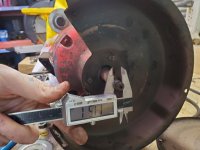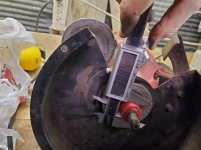I got this crappy little bench grinder for $20. Only problem with it is the spindle threads are all damaged on the left side (the side that has the left hand threading unfortunately). I want to buy a left hand die and try to clean them up, only problem is I don't know what the thread size is. I took the right side nut off and took some measurements (see photos) and now I'm trying to determine the thread size. I dont have a thread gauge, but maybe I need to get one. Looks close to either 9/16"-12 or 1/2"-13? The actual measure diameter is 0.453 and I count about 12 TPI. I took the nut of with a 3/4" wrench if that helps.
I don't know the make or model of the grinder because the name plate sticker is all worn off. I guess there isn't a standard size for these nuts? This grinder has a 3/4" arbour diameter if that matters. Also, there is like a 1.25" (30.84mm) bushing on the right side, whats that all about?
Thank you guys in advance!



I don't know the make or model of the grinder because the name plate sticker is all worn off. I guess there isn't a standard size for these nuts? This grinder has a 3/4" arbour diameter if that matters. Also, there is like a 1.25" (30.84mm) bushing on the right side, whats that all about?
Thank you guys in advance!




